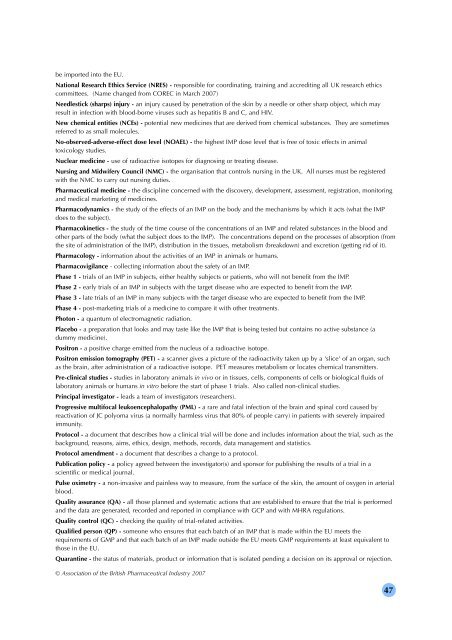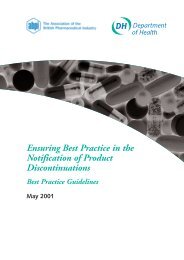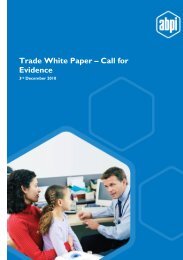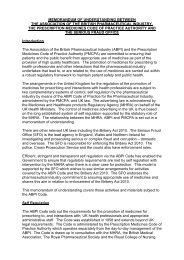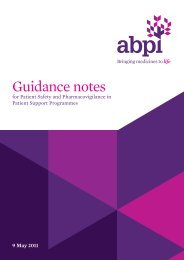ABPI Guidelines for Phase 1 Clinical Trials (PDF
ABPI Guidelines for Phase 1 Clinical Trials (PDF
ABPI Guidelines for Phase 1 Clinical Trials (PDF
Create successful ePaper yourself
Turn your PDF publications into a flip-book with our unique Google optimized e-Paper software.
e imported into the EU.<br />
National Research Ethics Service (NRES) - responsible <strong>for</strong> coordinating, training and accrediting all UK research ethics<br />
committees. (Name changed from COREC in March 2007)<br />
Needlestick (sharps) injury - an injury caused by penetration of the skin by a needle or other sharp object, which may<br />
result in infection with blood-borne viruses such as hepatitis B and C, and HIV.<br />
New chemical entities (NCEs) - potential new medicines that are derived from chemical substances. They are sometimes<br />
referred to as small molecules.<br />
No-observed-adverse-effect dose level (NOAEL) - the highest IMP dose level that is free of toxic effects in animal<br />
toxicology studies.<br />
Nuclear medicine - use of radioactive isotopes <strong>for</strong> diagnosing or treating disease.<br />
Nursing and Midwifery Council (NMC) - the organisation that controls nursing in the UK. All nurses must be registered<br />
with the NMC to carry out nursing duties.<br />
Pharmaceutical medicine - the discipline concerned with the discovery, development, assessment, registration, monitoring<br />
and medical marketing of medicines.<br />
Pharmacodynamics - the study of the effects of an IMP on the body and the mechanisms by which it acts (what the IMP<br />
does to the subject).<br />
Pharmacokinetics - the study of the time course of the concentrations of an IMP and related substances in the blood and<br />
other parts of the body (what the subject does to the IMP). The concentrations depend on the processes of absorption (from<br />
the site of administration of the IMP), distribution in the tissues, metabolism (breakdown) and excretion (getting rid of it).<br />
Pharmacology - in<strong>for</strong>mation about the activities of an IMP in animals or humans.<br />
Pharmacovigilance - collecting in<strong>for</strong>mation about the safety of an IMP.<br />
<strong>Phase</strong> 1 - trials of an IMP in subjects, either healthy subjects or patients, who will not benefit from the IMP.<br />
<strong>Phase</strong> 2 - early trials of an IMP in subjects with the target disease who are expected to benefit from the IMP.<br />
<strong>Phase</strong> 3 - late trials of an IMP in many subjects with the target disease who are expected to benefit from the IMP.<br />
<strong>Phase</strong> 4 - post-marketing trials of a medicine to compare it with other treatments.<br />
Photon - a quantum of electromagnetic radiation.<br />
Placebo - a preparation that looks and may taste like the IMP that is being tested but contains no active substance (a<br />
dummy medicine).<br />
Positron - a positive charge emitted from the nucleus of a radioactive isotope.<br />
Positron emission tomography (PET) - a scanner gives a picture of the radioactivity taken up by a 'slice' of an organ, such<br />
as the brain, after administration of a radioactive isotope. PET measures metabolism or locates chemical transmitters.<br />
Pre-clinical studies - studies in laboratory animals in vivo or in tissues, cells, components of cells or biological fluids of<br />
laboratory animals or humans in vitro be<strong>for</strong>e the start of phase 1 trials. Also called non-clinical studies.<br />
Principal investigator - leads a team of investigators (researchers).<br />
Progressive multifocal leukoencephalopathy (PML) - a rare and fatal infection of the brain and spinal cord caused by<br />
reactivation of JC polyoma virus (a normally harmless virus that 80% of people carry) in patients with severely impaired<br />
immunity.<br />
Protocol - a document that describes how a clinical trial will be done and includes in<strong>for</strong>mation about the trial, such as the<br />
background, reasons, aims, ethics, design, methods, records, data management and statistics.<br />
Protocol amendment - a document that describes a change to a protocol.<br />
Publication policy - a policy agreed between the investigator(s) and sponsor <strong>for</strong> publishing the results of a trial in a<br />
scientific or medical journal.<br />
Pulse oximetry - a non-invasive and painless way to measure, from the surface of the skin, the amount of oxygen in arterial<br />
blood.<br />
Quality assurance (QA) - all those planned and systematic actions that are established to ensure that the trial is per<strong>for</strong>med<br />
and the data are generated, recorded and reported in compliance with GCP and with MHRA regulations.<br />
Quality control (QC) - checking the quality of trial-related activities.<br />
Qualified person (QP) - someone who ensures that each batch of an IMP that is made within the EU meets the<br />
requirements of GMP and that each batch of an IMP made outside the EU meets GMP requirements at least equivalent to<br />
those in the EU.<br />
Quarantine - the status of materials, product or in<strong>for</strong>mation that is isolated pending a decision on its approval or rejection.<br />
© Association of the British Pharmaceutical Industry 2007<br />
47


